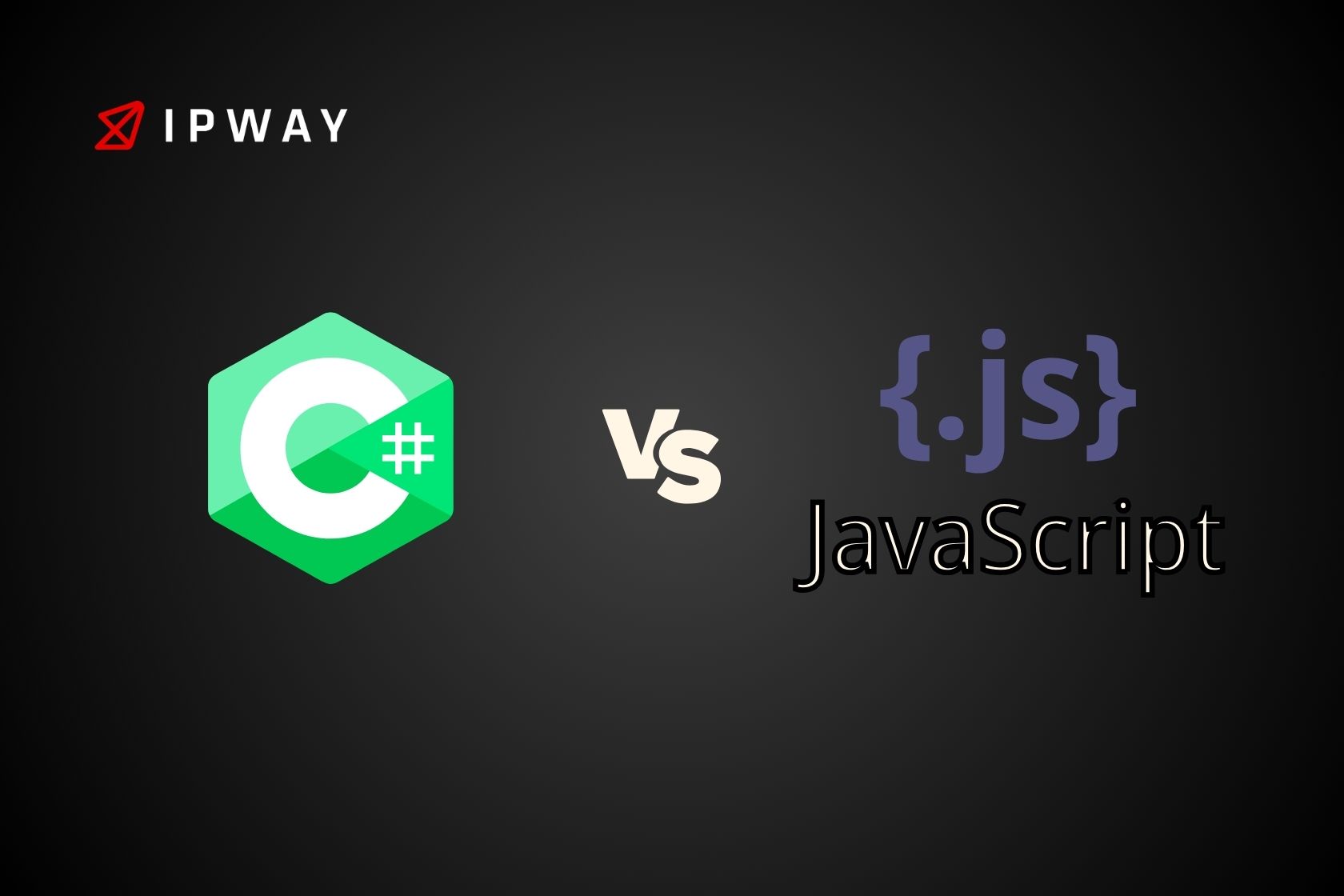Web scraping has become a tool across different sectors as it allows companies to collect and study information from a range of websites for competitive insights and market analysis purposes. The selection of the coding language for web scraping is pivotal, in ensuring effectiveness, reliability and user friendliness.
C# vs JavaScript stand out as top choices for web scraping due to their unique ecosystems and programming approaches that play a significant role in the effectiveness of your scraping tasks and data gathering requirements. So which language is more suitable, for your data sourcing needs?
In this piece of writing we will thoroughly compare between using the programming languages of Python and JavaScript in web scraping tasks. We will delve into the advantages and disadvantages well as when each language is best suited for different purposes. This information should equip you to make a decision when it comes to your web scraping endeavors.
C# vs JavaScript: Introduction to the Two Languages
To properly compare C# vs JavaScript for web scraping purposes it’s crucial to grasp the distinctions, between these two programming languages.
Microsoft developed C# which is a programming language that’s statically typed and follows an object oriented approach to coding tasks efficiently within the NET frameworks ecosystem known for its stability and speed in creating software applications across platforms other than Windows as well due, to the introduction of NET Core technology.

JavaScript is different in that its a language that changes types dynamically and is interpreted. It has grown to be the cornerstone of web development over time. Originally created as a scripting language for browsers on the client side JavaScript has progressed with the introduction of Node.js, which enables developers to apply JavaScript for tasks like server side programming and backend operations such, as web scraping.
C#: Features and Ecosystem
When it comes to web scraping tasks for projects, in the business world C sharp offers a diverse range of functionalities that make it an excellent choice of programming language.
1.Strong Typing and Static Compilation
C# known for its typing system requires variables to be defined with particular types and undergoes type verification during compilation to lower the chances of errors during runtime which provides developers with better command and foresight over their code.
When it comes to web scraping tasks involving datasets that require high performance and reliability are crucial benefits of using C#. Additionally its static nature compiles the code into a language (IL) that is run by the Common Language Runtime (CLR) thus enhancing performance optimization.
2.Asynchronous Programming with Task-Based Asynchronous Pattern (TAP)
When it comes to web scraping techniques it’s common to fetch data from several web pages at the same time. This is where asynchronous programming really shines. Using C#’ Task Based Asynchronous Pattern (or TAP) developers can create code that doesn’t block and can manage tasks concurrently like making various HTTP requests, to different websites.
When you’re scraping a website as an example scenario; you have the option to employ the async and await keywords to send HTTP requests in a manner. This means your application can keep functioning on other tasks while it waits for the server to reply back! This way helps cut down on downtime. Boosts the speed of your scraping process.
3.NET Ecosystem and Libraries
In the.NET ecosystems realm lies C# offering a slew of libraries and tools that streamline the process of web scraping tasks.
HtmlAgilityPack: An efficient tool, for analyzing HTML content enabling developers to access websites and traverse the document structure to retrieve information.
AngleSharp: Another known C sharp library offers features for managing HTML,CSS and JavaScript in web pages.It is particularly valuable for extracting data, from web pages that depend on JavaScript to display dynamic content.
HttpClient: I found a HTTP client tool that simplifies sending HTTP requests and dealing with responses while managing cookies when scraping data.
4.Cross-Platform Capabilities
Even though C sharp was initially created for Windows systems it has evolved into a language that can be used across different platforms with the help of.NET Core technology This allows you to build web scraping applications using C that work seamlessly on Windows Linux and macOS operating systems.
One instance is when a developer skilled, in C# employs.NET Core and Docker to package their web scraping program into containers This way it becomes transportable across settings and more straightforward to expand.

JavaScript: Features and Ecosystem
JavaScript is commonly used in web development. Is also valuable for web scraping purposes due to its adaptiveness and wide range of libraries available, for such tasks.
1.Dynamic Typing and Flexibility
JavaScripts dynamic typing system enables prototyping and swift development processes in a way that differs from C#. In JavaScript you don’t need to declare variable types as you do in C# which simplifies the writing and editing of scraping scripts.
The drawback of this flexibility is that JavaScript is susceptible, to runtime errors since type mismatches are only detected during script execution This could lead to issues while web scraping if not handled with caution.
2.Asynchronous Execution and Event-Driven Model
Like C#, JavaScript also enables asynchronous execution that is essential for web scraping tasks on the internet browser pages of websites and apps too! JavaScript accomplishes this by leveraging Promises along with the async and await syntax features, in its programming structure – giving developers the ability to send HTTP requests to websites at the same time and handle the received responses without interrupting the flow of other code execution processes.
When it comes to JavaScript’s event driven framework in Node.js for managing extensive web scraping tasks its architecture stands out as an excellent choice. This is because Node.js operates on a threaded event loop, which boosts its effectiveness for tasks that deal with input/output activities such, as sending and receiving HTTP requests.
3.Cross-Platform Compatibility
JavaScript is designed to work on platforms seamlessly since it can operate on both client side and server side environments alike.
For instance JavaScript is compatible with browser automation tools such, as Puppeteer allowing developers to extract dynamic content that loads only after a webpages JavaScript is run.
4.JavaScript Web Scraping Libraries
The JavaScript ecosystem offers a wide range of libraries specifically designed for web scraping:
Cheerio: It’s a library that enables you to analyze and modify the Document Object Model (DOM) just like jQuery does but for server side operations. It’s particularly useful, for grabbing fixed information from websites.
Puppeteer: Puppeteer is a tool for developers to scrape dynamic content using a headless browser automation technique It can imitate user actions such as clicking buttons and entering information into forms. Perfect for extracting data from websites that rely on JavaScript, for content rendering.
Axios: Using a promise driven HTTP client makes sending HTTP requests, in Node.js or the browser especially when accessing JSON data from API endpoints.
C# vs JavaScript: Pros
C# Pros
- Strong Typing: Helps decrease runtime errors and results, in code behavior that’s easier to anticipate.
- Performance: Running compiled code results, in execution speeds and is better suited for extracting substantial volumes of data.
- .NET Ecosystem: Provides a range of libraries and resources such, as HtmlAgilityPack to enhance scraping capabilities effectively.
- Asynchronous Programming: The Task Based Asynchronous Pattern helps in managing numerous requests.
- Cross-Platform Compatibility: With the use of.NET Core technology, in C# applications have the ability to operate on a range of platforms including Windows and Linux systems.
JavaScript Pros
- Flexibility: Working with dynamic typing simplifies the process of creating and adjusting scraping scripts.
- Asynchronous Execution: Non blocking scraping operations are made efficient by utilizing promises and async await features.
- Event-Driven Architecture: Perfect for managing scraping tasks while using minimal resources efficiently.
- Cross-Platform Support: JavaScript is able to operate on both the client and server sides which adds to its flexibility, for scraping assignments.
- Rich Ecosystem: Tools such as Puppeteer and Cheerio allow you to extract information, from both fixed web content seamlessly.
C# vs JavaScript: Cons
C# Cons
- Steeper Learning Curve: Learning C#, with its emphasis on typing and structured methodology may present more challenges, than picking up JavaScript.
- Development Speed:Development progress might be hindered by compilation times when comparing them to the faster interpretive nature of JavaScript.
- Platform Dependencies: In the past Windows was commonly used; however.NET Core has helped reduce this.
JavaScript Cons
- Performance: JavaScript typically operates at a pace compared to compiled languages such, as C#.
- Loose Typing: Typings flexibility can sometimes lead to tricky bugs that are hard to spot when working on scraping projects.
- Single-Threaded Model: JavaScripts threaded design works well for input/output tasks but may encounter difficulties when handling computationally intensive operations.
C# vs JavaScript: In-Depth Analysis
When deciding whether to use C # vs JavaScript for web scraping purposes it’s important to consider the challenges presented by your project. C # offers an organized and high. Efficiency setting, though it comes with a more challenging learning curve and development requirements. On the other hand, JavaScript is known for its adaptability and useful resources in dealing with dynamic content yet it may face difficulties, in handling larger-scale scraping projects when it comes to performance.
When dealing with web scraping tasks that require manipulating elements on dynamic websites using JavaScript along with tools such as Puppeteer is a common approach. For business scraping projects that demand handling numerous simultaneous requests efficiently opting for C# and its.NET libraries, like HtmlAgilityPack would probably be more suitable.
Which to Choose Between C# vs JavaScript for Web Scraping?
When it comes to web scraping tools in programming languages, like Python and JavaScript each has its strengths. Here’s a comparison between C# vs JavaScript to help you decide which one to use in scenarios:
Choose C# if:
- For scraping projects, like yours, reliability and efficiency are crucial.
- Your project is already part of the.NET environment.
- Ensuring type safety and minimizing runtime errors are crucial, for the outcomes of your project.”
- You’re extracting defined information from websites that don’t rely heavily on JavaScript based elements, for interaction.
Choose JavaScript if:
- Your website scraping requirements include content that depends on rendering on the client side.
- You require a solution that’s nimble and adaptable to accommodate rapid changes and extract real time data effectively.
- Harness the array of scraping libraries available in JavaScript such as Cheerio, Puppeteer and Axios, to your advantage.
- Your task includes gathering information from sources, like web browsers and Node.js setups.
Conclusion
When comparing C# vs JavaScript in the context of web scraping discussions both languages present benefits and drawbacks. C# with its strength lying in tasks demanding performance and dependability is a great fit for enterprise scale projects. On the hand JavaScript excels in situations that call for adaptability, real time data retrieval and engagement, with constantly changing content.
In the end the choice should depend on what your web scraping project needs. You have to consider whether you go with C# vs JavaScript as both languages offer a wide range of libraries and tools to assist you in effectively pulling out and managing web data.
Are you looking to scale your web scraping projects and avoid IP blocks? IPWAY offers top-tier proxy solutions that can help you scrape Bing and other search engines with ease.
